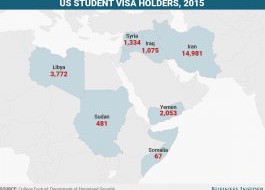
Throughout his presidential campaign, Donald Trump repeatedly disparaged what he saw as America's failing school system.
"We are rated 28 in the world. The United States, think of it, 28 in the world," he said in a video he uploaded to Facebook earlier this year. "Third-world countries are ahead of us."
Though he never explicitly mentioned the source of that rating, he was most likely referring to the international test most widely used as a tool for measuring education systems worldwide, the Program for International Student Assessment.
While "third world" originally referred to nations that were not allied with Western or communist countries, the phrase is widely used today to describe developing or poor countries. One country that continues to beat the US on the PISA is Vietnam, where the average income of a citizen is $5,070 yearly, compared with $53,470 for the US.
The results of the 2015 exam, released Tuesday, again support Trump's claims. The US remained flat in reading and science scores but declined 11 points in average math score, once again raising the question of global competitiveness of the US educational system.
When looking at a comparable sample of countries that participated in the PISA exam in both 2012 (when the test was most recently administered) and 2015, the US ranking fell to 35th from 28th in math.
Vietnam outperformed the US in both math and science.
 Business Insider
Business Insider
The PISA exam is a worldwide study administered every three years by the Organization for Economic Cooperation and Development, and it measures 15-year-olds from different countries in math, science, and reading.
While the results could seem disheartening to Americans, Jon Schnur, the executive chairman of America Achieves, says there are some factors that should provide some optimism for the US.
The US decline in math scores was not statistically different from the drop in scores among all OECD countries, Schnur said on a press call on Tuesday, and the US was No. 1 in the world in closing the achievement gap in between wealthy and disadvantaged students.
Schnur still said, however, that the US needed to make dramatic progress in showing educational improvement for students.




